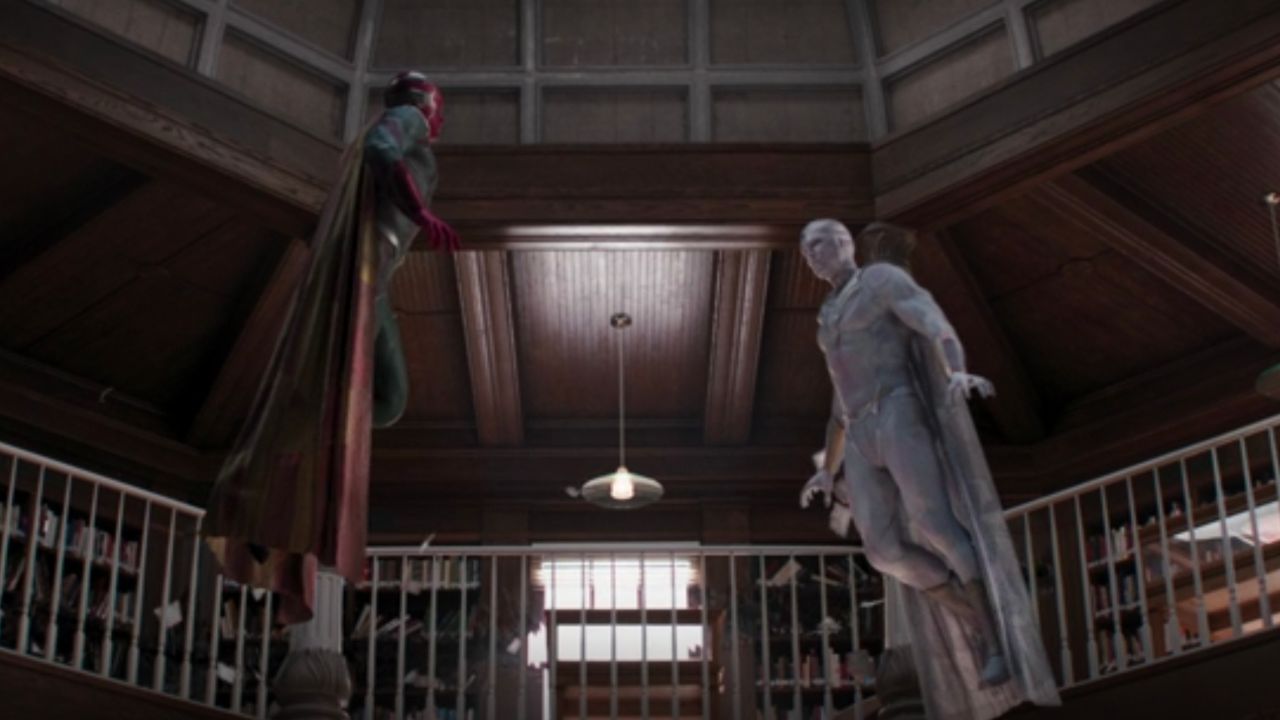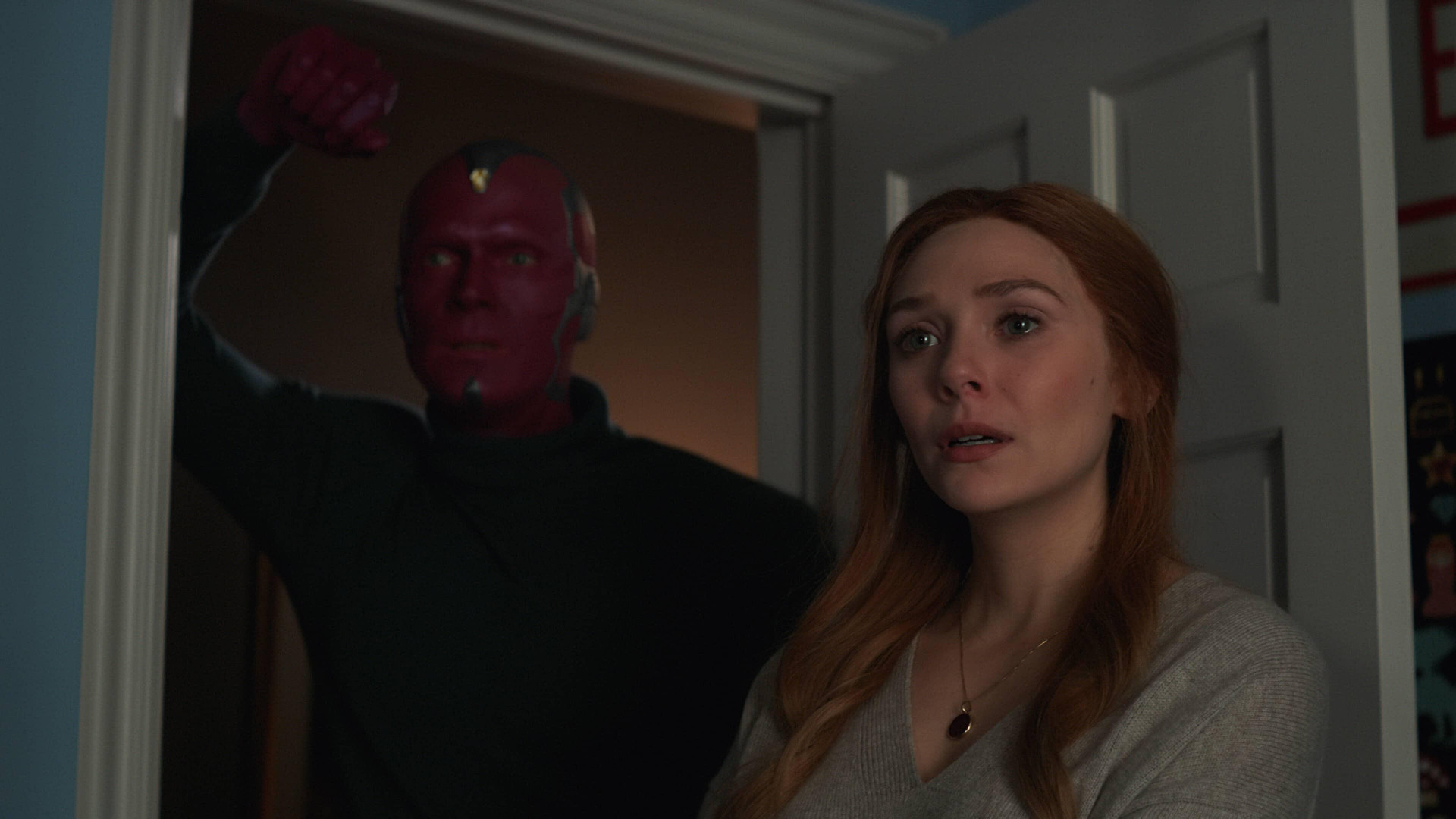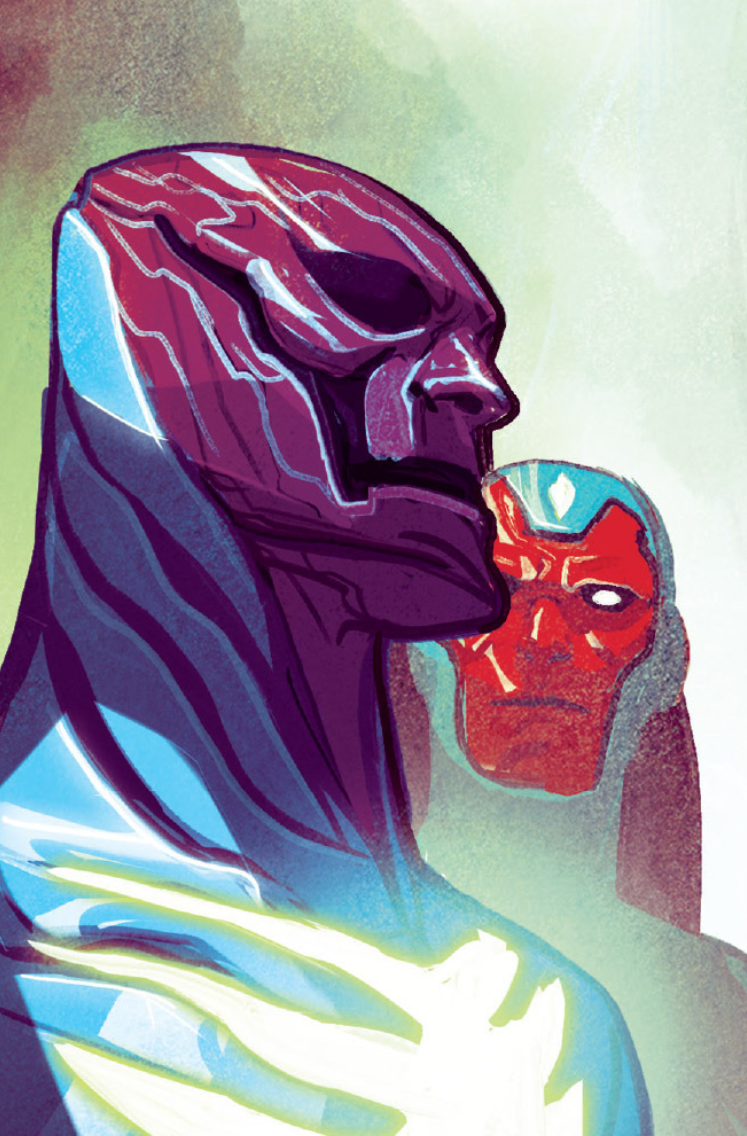WandaVision: The comic book roots of the finale's "Ship of Theseus" scene
Mark Waid didn't invent 'The Ship of Theseus' paradox, but he was the first writer to have two Visions discuss it

Spoilers for WandaVision:
One of the breakout moments of the WandaVision season finale was when in the middle of a typical MCU third act superhero vs. villain battle between Wanda's Vision creation and SWORD's reconstructed original (but white) Vision, a college philosophy class broke out.
Identical physical matches who probably would have eventually destroyed a good chunk of Westview if they kept fighting, Wanda's Vision recreation turned the tide by proposing the thought experiment 'The Ship of Theseus' to the white Vision, somewhat appropriately in the middle of the town library.

Vision's intellectual gambit worked too - it got white Vision to pause to consider and examine his circumstances, which results in the white Vision allowing Vision to 'download' his memories to him. Immediately causing a change exemplified by his eyes becoming less machine and more human-like, white Vision declares "I am Vision" and flies off away from WestView to whatever the next phase of the character's MCU evolution will be.
'#ShipOfTheseus' trended on Twitter on Friday and over the weekend, with WandaVision fans crediting Marvel Studios for coming up with a surprising moment that also feels so appropriate for the philosophical-leaning character.
But fans should actually be crediting the WandaVision writer's room more for their research skills because like many MCU story elements the scene was directly inspired by the comic books. In this particular case, they were inspired by 2017's Avengers Vol. 7 #6, by artist Mike de Mundo and writer Mark Waid, the final chapter of a story arc pitting the Earth's Mightiest Heroes against their long-time foe, the time-traveling Kang.

The context of Waid's original scene was different than WandaVision's. In the comic book story, seen here, the present-day Vision expresses being disconcerted by meeting himself from the "end of time," and learning he'll outlive everyone he knows and loves.
Comic deals, prizes and latest news
Get the best comic news, insights, opinions, analysis and more!
Future Vision, who looks very different than present-day Vision, then raises the 'The Ship of Theseus' paradox, asking that if all of Vision's parts have been replaced, are the two Visions truly the same being?
And if fans were jazzed at the break in superhero action for an intellectual thought experiment, imagine how Mark Waid felt when he was watching WandaVision and unexpectedly saw the moment come to life.
"Not a clue. It was a pleasant surprise," Waid tells Newsarama, asked if he any idea the scene was coming,
"It was like hearing Tom Cavanaugh use the words 'Speed Force' or Henry Cavill telling moviegoers that Superman's 'S" stands for hope," Waid adds, reminding us he's no stranger to having his comic book inventions being translated to the small and big screen.
"It's always nice to hear your words come back at you."
Waid recalls having the philosophical question rattling around in the back of his head for a while and found a place for it during that Vision scene as he was writing the dialogue, but it wasn't anything he had planned to use beforehand.
And despite the different contexts of his scene compared to the WandaVision adaptation, Waid was complimentary to how Marvel Studios used the idea.

"It fit beautifully into what I thought was a really satisfying final episode," he says.
Waid also responds very positively to our question about how comic book writers like himself react to Marvel Studios' use of story elements and plotlines straight from the comics.
"That's the best thing about Marvel Studios," Waid says, "the way they draw inspiration from past stories rather than try to reinvent absolutely everything for an imagined film audience who finds superheroes 'dull' unless they're super-dark and murdery."
As he reminds us, Waid, one of the most prolific comic book writers of the last 30 years, is no stranger to having comic book stories he wrote adapted to other mediums, and we asked whether there are any other scenes or storylines inspired by his writing that stand out for him.
"The biggest one was the animated Justice League: Doom, which was taken straight from 'Tower of Babel,'" he tells us.
'Tower of Babel' was a 2000 story arc Waid wrote for the series JLA (issues #43-46) with artist Howard Porter.
"Unfortunately for me, it was made during a weird pocket of time when DC's policy was to not credit creators or issue any sort of discretionary payment," Waid continues. "That I got no money for it, I understand; when you're doing work for hire, that's never a guarantee, but it sure would have been nice to have had my name on it given how freely DC admitted in all the press releases that Justice League: Doom was drawn from 'Tower of Babel.' But there's no point in being bitter about it; it is what it is."
Finally, asked if on the flip side there is anything he wrote that he'd like to see adapted to the screen one day, Waid echoes the likely sentiments of many DC fans...
"Someday, hopefully, while Alex Ross and I are still alive, someone's going to figure out how to do Kingdom Come," Waid says. "Hopefully."
The seminal DC event celebrates its 25th anniversary this year.
Read how the WandaVision finale channels another classic comic book moment for heartbreaking effect.
I'm not just the Newsarama founder and editor-in-chief, I'm also a reader. And that reference is just a little bit older than the beginning of my Newsarama journey. I founded what would become the comic book news site in 1996, and except for a brief sojourn at Marvel Comics as its marketing and communications manager in 2003, I've been writing about new comic book titles, creative changes, and occasionally offering my perspective on important industry events and developments for the 25 years since. Despite many changes to Newsarama, my passion for the medium of comic books and the characters makes the last quarter-century (it's crazy to see that in writing) time spent doing what I love most.


